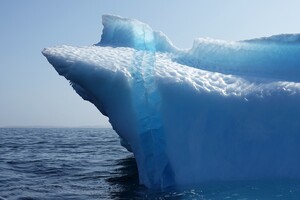The island lost six billion tons of water every day for a week.

The abnormally high temperature that has set in Greenland resulted in the island losing a critical amount of water for several days. According to CNN, only on July 15-17, Greenland lost six billion tons of water per day.
This would be enough to fill 7.2 million Olympic swimming pools. The melting of the glaciers was connected with the fact that the temperature in Greenland reached 15.5 degrees Celsius, which is 10 degrees above normal.
Read also: Scientists have found a “secret” population of polar bears in Greenland Kharkiv and Dnipropetrovsk regions combined – ed.) with a layer of water 30 centimeters high.
Ted Scambos, a senior scientist at the National Snow and Ice Data Center at the University of Colorado, said that this melting is “abnormal” given the past 30 to 40 years of data. The recent event was a “spike” of this melting.
Last year, scientists fear new record temperatures and a repeat of 2019, when 532 billion tons of ice melted. The warm spring and July heat this year led to melting of almost the entire surface of the ice sheet. As a result, the global sea level rose by 1.5 millimeters. If all of Greenland's ice melts, it will cause sea levels to rise by 7.5 meters.
The latest research paints an increasingly disturbing picture of what is happening on the largest ice island in the Northern Hemisphere. For example, the work published in February showed that at the bottom of the Greenland ice sheet there is an unprecedented rate of melting, caused by a huge amount of meltwater flowing from the surface. This water is particularly dangerous because it can destabilize the ice sheet above it and lead to massive and rapid ice loss.
In 2020, scientists found that the melting of Greenland has passed the point of no return, and no efforts to prevent global warming will be able to stop it. Another study showed that the rate of melting of the island in recent years exceeds all indicators observed in the last 12 thousand years.
Recall that data from the European Copernicus satellite system showed that the last seven years were the hottest in the history of observations< /strong>. Last year, 2021, became the fifth in the list of the hottest years, in some regions temperature records were registered.
See the special topic: In the next 40 years, the heat will only intensify – WMO The temperature rises to abnormal indicators more and more often due to climate change. A “sand battery” was created in Finland that will help fight climate change According to the developers, the battery should solve the main problem of green energy. Antarctic's only endemic insect may disappear due to climate change Winters are getting warmer, making it harder for insects to survive. Global warming could help open an Arctic sea route not controlled by Russia The Northern Sea Route is currently one of the few ways to sail across the Arctic. Warming in the Arctic: the temperature in the Barents Sea is “off the charts” Scientists believe that this may cause extreme weather events in the USA and Europe.




